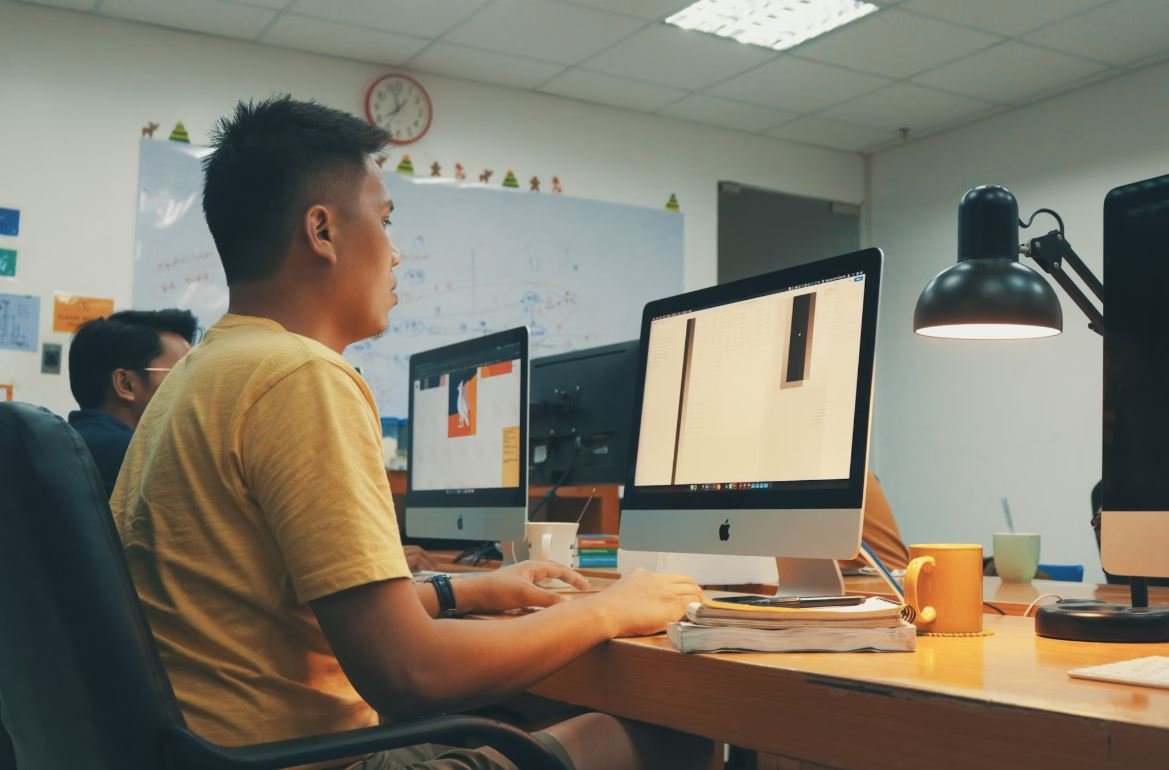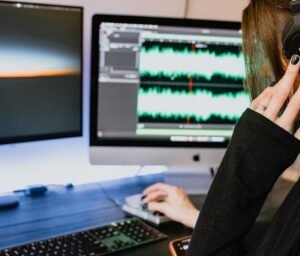AI and Music Industry
The music industry has witnessed significant transformation due to the integration of Artificial Intelligence (AI).
AI technology is revolutionizing the way music is created, distributed, and consumed. From assisting in composition
and production to personalized music recommendations, AI is reshaping the landscape of the music industry.
Key Takeaways:
- AI is transforming the music industry through various applications such as music composition, production, and
recommendation systems. - AI-powered music platforms offer personalized recommendations based on user preferences and behavior patterns.
- AI-generated music raises questions about creative ownership, copyright, and the future of human artists in
the industry.
**AI in music** is not limited to creating a catchy melody or a beat; it extends its capabilities to various aspects
of the music production process. AI algorithms can analyze vast amounts of musical data, allowing artists and
producers to experiment with different sounds and arrangements. Through machine learning, AI can understand patterns
and trends in music, providing valuable insights and enhancing the creative process. This technology enables faster
experimentation, pushing the boundaries of what is musically possible. *AI assists in the composition process by
generating musical ideas and suggesting chord progressions that align with the desired style.*
AI’s influence on the music industry is profoundly felt in music recommendation systems. Streaming platforms
leverage AI algorithms to analyze user listening habits and preferences, enabling personalized music suggestions. AI
uses data such as the user’s listening history, favorite artists, and similar user profiles to create tailored
playlists and discover new music. By understanding individual preferences, AI allows users to explore a diverse range
of music and discover hidden gems. *Artificial intelligence enhances the music listening experience by curating
personalized playlists and introducing users to new music they are likely to enjoy.*
Role of AI in the Music Industry
AI has a significant impact on the music industry by transforming various functions and roles within the ecosystem.
Some notable roles and applications of AI in the music industry include:
- Automated music composition: AI generates original compositions or assists composers in their creative process.
- Audio synthesis and manipulation: AI can create realistic-sounding instruments and alter audio recordings.
- Enhanced music production: AI algorithms help in mixing, mastering, and improving the overall audio quality.
- Virtual artists and virtual concerts: AI-powered virtual performers create unique experiences for audiences.
AI vs. Human Creativity
The rise of AI-generated music raises questions about the role of human creativity and the future of human artists in the
industry. While AI can assist in the creative process, it is important to recognize the value of human emotions, artistic
expression, and cultural context. *Ultimately, AI can enhance creativity, but it cannot replace the depth of human
emotions and the distinct perspectives that human artists bring to their work.*
| Application | Description |
|---|---|
| Automated Music Composition | AI generates original compositions or assists composers in their creative process. |
| Audio Synthesis and Manipulation | AI creates realistic-sounding instruments and alters audio recordings. |
| Enhanced Music Production | AI helps in mixing, mastering, and improving the overall audio quality. |
| Benefit | Description |
|---|---|
| Personalized Recommendations | AI analyzes user preferences to create tailored playlists and suggest new music. |
| Discoverability | AI introduces users to new music based on their listening habits and similar profiles. |
| Improved Music Exploration | AI allows users to explore a diverse range of music, genres, and artists. |
| Aspect | AI’s Role | Human’s Role |
|---|---|---|
| Creative Process | AI assists in generating ideas and suggesting musical elements. | Humans provide deep emotions, cultural context, and distinct perspectives. |
| Artistic Expression | AI can mimic artistic styles but lacks genuine human expression. | Humans infuse their work with personal passion and authenticity. |
| Cultural Significance | AI may lack the understanding of cultural context and societal impact. | Humans reflect societal values and address cultural nuances through their music. |
The Future of AI in Music
The evolution of AI in the music industry is still in its early stages, and the possibilities are continuously expanding.
As technology progresses, AI is expected to play a larger role in music creation, production, and distribution. However,
it is crucial for industry stakeholders to navigate the ethical and legal implications of AI-generated music, including
questions surrounding creative ownership. The integration of AI with the music industry opens up exciting opportunities
while also posing challenges that require careful consideration. *The future of AI in the music industry promises
innovative collaborations between human artists and AI technologies, pushing the boundaries of creativity and musical
experiences.*

Common Misconceptions
Misconception 1: AI will replace human musicians
One common misconception about AI in the music industry is that it will completely replace human musicians. While AI has certainly made advancements in generating music and creating algorithm-driven compositions, it is far from being able to replace the creativity and emotion that human musicians bring.
- AI still lacks the ability to fully understand and interpret human emotions, which is a crucial aspect of music creation.
- Human musicians possess the ability to improvise and adapt to various situations, adding a unique touch to their performances that AI cannot replicate.
- The collaboration between AI and human musicians can actually enhance the creative process, resulting in unique and innovative musical creations.
Misconception 2: AI-generated music lacks originality
Another misconception is that AI-generated music is simply a replication of existing works, lacking originality and creativity. However, AI can actually produce highly original compositions through the analysis and synthesis of existing musical patterns and structures.
- AI algorithms have the ability to identify patterns and generate music that goes beyond typical human creativity, resulting in unique and unexpected compositions.
- AI can offer fresh insights and novel perspectives on musical composition, pushing the boundaries of what is considered traditional or expected in the music industry.
- AI-generated music can serve as a source of inspiration for human musicians, helping them explore new ideas and approaches in their own creations.
Misconception 3: AI will lead to unemployment in the music industry
Many people believe that the integration of AI in the music industry will lead to widespread unemployment among musicians and other industry professionals. However, AI technology offers more opportunities and can actually augment the work of musicians rather than replace them.
- AI can assist musicians in tasks such as music production, composition, and arrangement, freeing up their time to focus on other aspects of their craft.
- AI-powered tools can help musicians refine their skills, providing personalized feedback and suggestions for improvement.
- The integration of AI can also drive innovation in the music industry, creating new jobs and roles in areas such as AI music engineering and AI music curation.
Misconception 4: AI undermines the value of musical creativity
Some argue that AI-generated music diminishes the value of human creativity in the music industry. However, AI should be seen as a tool that complements human creativity rather than competing against it.
- AI-generated music can be used as a starting point or a source of inspiration for musicians, helping them expand their creative horizons.
- The human touch is still necessary in the music industry, as it is the ability of musicians to infuse their own emotions, experiences, and individuality into their music that makes it truly unique.
- AI can empower musicians to experiment and explore new musical styles and genres, helping to keep the industry dynamic and vibrant.
Misconception 5: AI is a threat to music copyright
Concerns have been raised that AI could potentially infringe on copyright laws in the music industry. While AI can generate music similar to existing compositions, it also has the potential to contribute to better copyright protection and licensing processes.
- AI algorithms can assist in identifying and flagging potential copyright infringements, helping to ensure that rights are protected and respected.
- AI technologies can be used to streamline and automate licensing processes, making it easier for musicians and copyright owners to manage and monetize their works.
- By improving copyright protection and licensing, AI can potentially incentivize creativity in the music industry by establishing a fair and efficient system for artists to be compensated for their work.

AI Creating Music Genres
In the music industry, artificial intelligence (AI) has emerged as a powerful tool for creating new and unique music genres. AI algorithms analyze vast amounts of music data to identify patterns and generate innovative compositions. The following table showcases some fascinating examples of AI-created music genres:
| Music Genre | Description |
|---|---|
| Electroshock | A fusion of electric and classical sounds, characterized by intense beats and dramatic melodies. |
| Cyberwave | A futuristic genre blending synth-driven melodies, heavy basslines, and cyberpunk-inspired themes. |
| Quantum Rock | A genre that combines elements of classic rock with electronic soundscapes, creating a captivating and energetic experience. |
Impact of AI on Music Production
AI technology has revolutionized music production, speeding up the process of creating and editing music tracks. This table provides insights into the various ways AI is transforming music production:
| Aspect | Benefits of AI |
|---|---|
| Composition | AI algorithms enable composers to generate complex musical structures efficiently, saving time and fostering creativity. |
| Arrangement | AI software helps arrange musical elements by automatically suggesting harmonies, chord progressions, and instrumentation choices. |
| Mixing and Mastering | AI-based tools streamline the mixing and mastering process, improving audio quality and allowing artists to achieve professional results. |
AI in Music Recommendation Systems
Music recommendation systems powered by AI effectively personalize the listening experience for users, tailoring suggestions based on individual preferences. This table highlights some key aspects of AI-driven music recommendation systems:
| Feature | Benefits of AI |
|---|---|
| Discover New Artists | AI algorithms analyze listening habits and similarities between artists, introducing users to emerging talents they might enjoy. |
| Personalized Playlists | AI creates customized playlists based on user preferences, moods, and contextual factors, enhancing the listening experience. |
| Smart Music Curation | AI algorithms curate music collections by considering factors such as genre, tempo, lyrics, and user feedback, creating tailored content for music enthusiasts. |
AI in Music Copyright Protection
AI technologies have also been applied to the protection of music copyright, assisting in identifying unauthorized use of musical compositions. The table below showcases how AI contributes to music copyright protection:
| Function | Advantages of AI |
|---|---|
| Content Identification | AI algorithms use audio fingerprinting to detect instances of music plagiarism or unauthorized sampling, helping protect artists’ rights. |
| Monitoring Platforms | AI-powered platforms continuously monitor digital platforms and identify unauthorized music uploads, aiding in infringement prevention. |
| Data Analysis | AI tools analyze vast amounts of data and compare it with existing musical works to identify potential similarities and copyright violations. |
AI and Live Music Performances
Artificial intelligence plays a significant role in live music performances, enhancing the dynamic interaction between musicians and technology. The following table presents some examples of AI integration in live music performances:
| Application | Benefits of AI |
|---|---|
| Real-time Effects | AI systems apply live effects, such as vocal harmonization or audio modulation, enhancing the expressive capabilities of musicians during performances. |
| Virtual Instruments | AI-powered virtual instruments provide musicians with a vast palette of sounds and allow for unique sound generation and manipulation on stage. |
| Interactive Visuals | Through AI, visual elements, such as real-time projections or responsive lighting, synchronize with the music, creating immersive live experiences. |
Economic Impact of AI in the Music Industry
The integration of AI technology has significant economic implications for the music industry, transforming various aspects of the business. The following table examines some specific economic impacts of AI in the music sector:
| Aspect | Economic Impact |
|---|---|
| Revenue Growth | AI-driven music platforms contribute to revenue growth by enhancing user engagement and facilitating targeted advertising. |
| Cost Reduction | AI automates tasks like royalty calculations, copyright monitoring, and content tagging, reducing operational costs for record labels and publishers. |
| Market Analysis | AI enables advanced market analysis by predicting trends, identifying emerging markets, and supporting data-driven decision-making. |
Ethical Considerations in AI-Generated Music
While AI-generated music presents exciting opportunities, it also raises ethical concerns regarding authorship, creativity, and authenticity. The table below sheds light on some ethical considerations associated with AI-generated music:
| Consideration | Ethical Implications |
|---|---|
| Authorship Attribution | AI-created music challenges traditional notions of authorship and raises questions about giving due credit to human composers who utilize AI tools. |
| Artistic Originality | AI-generated music blurs the line between human creativity and machine algorithms, prompting discussions around the authenticity of AI compositions. |
| Economic Disruption | The widespread use of AI in music production may disrupt the traditional music industry model, potentially impacting musicians’ livelihoods and revenue streams. |
Collaboration between Musicians and AI
AI is increasingly viewed as a valuable collaborator for musicians, offering new perspectives and pushing creative boundaries. The following table highlights key aspects of collaboration between musicians and AI:
| Benefits | Examples |
|---|---|
| Exploration of New Sounds | AI exploration tools inspire musicians to experiment with unconventional sounds and textures, unlocking innovative sonic possibilities. |
| Enhanced Songwriting | AI assists musicians in the composition process by suggesting melodic variations, chord progressions, and harmonies, sparking new ideas. |
| Real-time Improvisation | AI algorithms can dynamically respond to live musical input, enabling seamless improvisation between musicians and AI-driven systems. |
Future Perspectives
The integration of AI in the music industry opens up exciting possibilities for innovation, creativity, and personalization. By leveraging AI’s potential, the music industry can explore uncharted territories and reshape the way we produce, consume, and experience music. The journey towards a harmonious collaboration between humans and intelligent machines is just beginning, and its symphony is yet to be fully composed.
Frequently Asked Questions
AI and Music Industry
-
What is AI’s role in the music industry?
AI has various roles in the music industry, such as generating music, assisting in music composition and production, improving music recommendations, analyzing data for market insights, providing personalized music experiences, and automating certain tasks in music distribution and licensing.
-
How does AI generate music?
AI generates music using techniques like machine learning, deep learning, and neural networks. By training models on vast amounts of existing music, AI can learn patterns, styles, and even generate new compositions based on given inputs and parameters.
-
Can AI replace human musicians?
AI can simulate the style of human musicians and create music, but it cannot completely replace the creativity, emotion, and artistic nuances that human musicians bring to their performances. AI is seen more as a tool or collaborator to enhance human creativity rather than a replacement.
-
How is AI used in music production?
AI is used in music production for tasks like automating mixing and mastering processes, improving audio quality, detecting and removing noise, assisting in sound design, suggesting chord progressions or melodies, and streamlining workflow by providing intelligent recommendations and tools.
-
How does AI improve music recommendations?
AI analyzes user listening patterns, preferences, and music metadata to make personalized music recommendations. By employing algorithms that understand the relationships between different songs, genres, and users, AI can suggest relevant and tailored music recommendations to enhance user experience on streaming platforms.
-
What market insights can AI provide in the music industry?
AI can analyze extensive data related to music consumption, trends, listener demographics, and user behavior to provide valuable market insights. This information allows industry professionals to understand audience preferences, identify emerging trends, make data-driven decisions, and tailor their marketing strategies accordingly.
-
How does AI provide personalized music experiences?
AI can analyze user data, including listening habits, preferences, moods, and contextual factors, to create personalized music experiences. It can generate personalized playlists, curate music tailored to specific activities or states of mind, and even modify music in real-time based on user input or biometrics for a more immersive experience.
-
How does AI automate tasks in music distribution and licensing?
AI can automate various tasks in music distribution and licensing, such as content identification and copyright management, royalty calculations and payments, metadata enrichment, and matching music with suitable licensing opportunities. This automation helps streamline processes, reduce human errors, and speed up the overall licensing and distribution workflows.
-
What are the ethical considerations surrounding AI in the music industry?
Ethical considerations in the music industry relate to ownership and copyright issues, transparency in AI-generated music, potential biases in music recommendations based on user data, employment implications for human musicians and professionals, and the overall impact of AI on the diversity and originality in the music landscape.
-
What are the future trends and developments expected in AI and the music industry?
The future of AI in the music industry is promising, with continued advancements in generative models, enhanced music recommendation algorithms, augmented music production tools, increased use of AI in live performances and immersive experiences, and further exploration of AI’s potential for music education, analysis, and collaboration.




